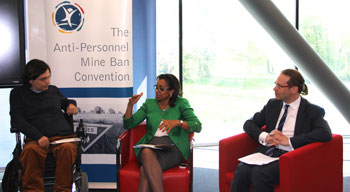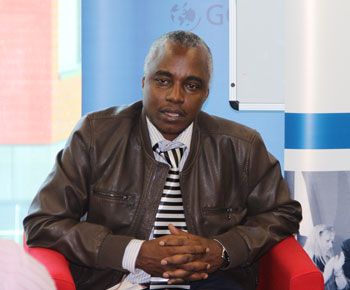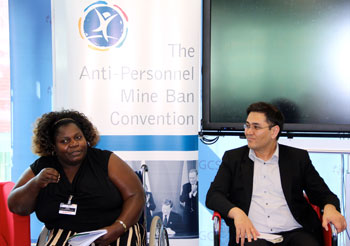|
23.04.2015
Geneva, 23 April 2015 – Experts have called for global discussions on supporting landmine survivors to be converted into a template for action at the national level. At an event convened in Geneva by Costa Rica, the Chair of the Anti-Personnel Mine Ban Convention’s Committee on Victim Assistance, experts explored ways to follow-up on the Bridges between Worlds global conference that took place in Medellin, Colombia in April 2014. “Bridges between Worlds was an important discussion,” said Ambassador Elayne Whyte of Costa Rica. “Our opportunity is to now take that discussion and convert it into action. ”Bridges between Worlds aimed to advance the international community’s understanding regarding the place of assistance to victims of mines and other explosive remnants of war in broader contexts. It was held further to the understanding of the States Parties to the Anti-Personnel Mine Ban Convention that victim assistance should be integrated into broader national policies, plans and legal frameworks related to human rights, disability, health, education, employment, development and poverty reduction. Experts recalled that Bridges between Worlds reaffirmed that, while assisting landmine victims is a specific promise made through the Anti-Personnel Mine Ban Convention, victim assistance is not as world unto itself. Rather, it is part of – or should be part of – other worlds.
Facundo Chavez of the United Nations Office of the United Nations High Commissioner for Human Rights highlighted that those who care deeply about the fulfilment of the Convention’s promise to landmine victims and survivors have much in common with those concerned with the well-being and the rights of women, girls, boys and men injured and living with disabilities regardless of the cause. “There is strength in pursuing this unity of purpose and working together towards the achievement of common goals,” said Mr. Chavez.
The emphasis on a unity of purpose was underscored by Martin Babu, a Member of the United Nations Committee on the Rights of Persons with Disabilities. Mr. Babu stressed that the cause of disability is not important. What is important is that “an enabling environment” be established in order that all persons with disabilities – including landmine survivors – can participate in their societies on a basis equal to others. Senator Godliver Omondi of Kenya, who represents persons with disabilities in the Kenyan parliament’s upper house, noted that the organization that she chairs – the United Disabled Persons of Kenya – has a membership that is diverse but focused on addressing a number of similar challenges and barriers.
Firoz Alizada, representing the International Campaign to Ban Landmines (ICBL), highlighted how Bridges between Worlds led to increased collaboration between the ICBL and the International Disability Alliance. He noted that some efforts have already been undertaken at the country level to ensure that the voices of landmine survivors contribute to broader disability rights efforts. Caroline Wörgötter of the Permanent Mission of Austria to the United Nations (Geneva) recalled that, at the Anti-Personnel Mine Ban Convention’s Maputo Review Conference in June 2014, the States Parties mandated a new Committee on Victim Assistance to reach out to others who share a common agenda. She also highlighted that the victim assistance section of the Maputo Action Plan 2014-2019 implies that efforts should be made to build bridges at the national level, where implementation occurs. The event closed with experts pointing to some concrete suggestions that would lead to a difference being made at the national level. These suggestions included establishing strategies and plans – and doing so in a manner that is inclusive of persons with disabilities, collaborating with the capacity that has been built as a result of human rights treaty body reform to assist States in reporting on the implementation of the Convention on the Rights of Persons with Disabilities, and drawing from the recommendations of the Committee on the Rights of Persons with Disabilities as a road map for action. For more information, contact: Kerry Brinkert +41 (0) 22 730 93 10, press(at)apminebanconvention.org. Find us on Facebook, Flickr or Twitter.
|





